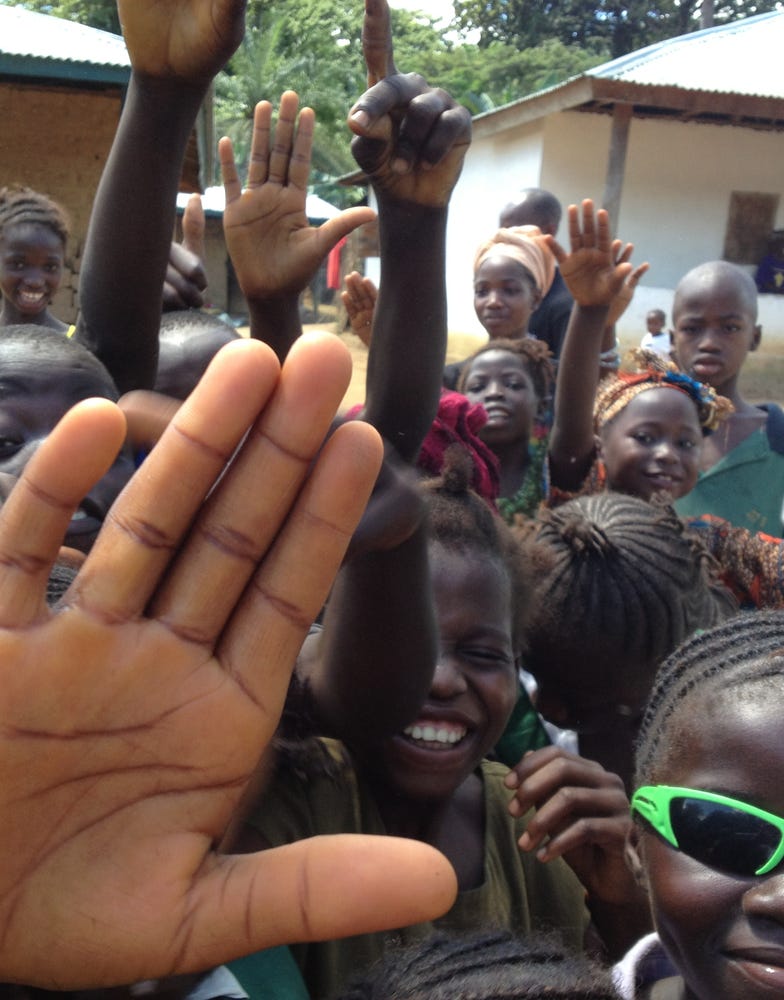I have two hands: one for me, one for other people."
— Millie Bobby Brown, actress and UNICEF Goodwill Ambassador
My heart is heavy. At first I think stone, the weight of a smooth river rock in my fist, but no, not stone. I remember the weight of Fataba’s hand in mine, intensely warm and moist in the tropical heat as she led me through crowds of curious villagers. Osman took my hand, helping me down from the land rover at each stop. It surprised me how small and slender his hands were, relative to Fataba’s, his palms suede-soft.
The hand is heavier than the heart, twice the weight. Holding hands snugly, you can feel another’s heart, beating.
Always people took my hands as I entered their village. Sometimes my arms would be swinging free as I headed to see a school or visit a hut serving as a clinic. I would feel small fingers then a delicate sweaty palm slip into my hand. While I looked down to see what child had mustered the courage to touch and hold on to the strange visitor, I’d feel another steamy little mitt grasp my other hand.
With the men, it was the elaborate handshake, essentially three different handshakes in quick succession. Many of the chiefs shook my hand as if I were the chief of my own distant village. It was hard for them to imagine a woman venturing so far on her own, so they assumed I must be what they called locally a Mammy Chief. I quickly learned the complicated greeting, and by the third day up-country, as I met new elders and chiefs, they would nod in approval as we progressed through the handshaking ritual. Their hands were the most wet and dense, arriving from physical work in hot sun, tending their farms and walking everywhere. If Islamic, they often greeted me draped in a boubou, a long thickly-woven robe layered over pants, which having been given one as a gift, I can say is sweltering—if you cup your hands while wearing one, you can almost drink your own perspiration.
Women were constantly taking my hands, stroking the length of my arm or marveling as they caressed thin strands of my hair gone wild and wavy in the humidity. I was both a bizarre object examined closely and an unexpected gift receiving gratitude. “Tenki, tenki,” one woman and then another would say, meaning ‘thank you’ in Krio. “Tenki for coming to us. Will you remember me?” The fingers of others laced into mine, coaxing me to dance with groups of women and girls, their bodies glistening with sweat, shuffling and swirling, happy. Personal boundaries are different in Sierra Leone, and relationships more tactile. Women hold hands as they walk together or talk standing face-to-face at the edge of a puddle.
I realize only now how held I was by the local people, my hands always in the company of others. Our palms together were as the inside of an oyster, damp and slightly gritty. We could make a pearl like this, I thought more than once.
To be completely honest, I also thought, hand sanitizer, recalling how sick I’ve returned from other developing countries. There was the six-week malaise after a street woman, clearly unwell, hugged me in Salvador, Brazil, tying a Bahia ribbon (a wish bracelet) around my wrist for good luck. And there’s the intestinal damage after eating local in the rural highlands of Ecuador, food handled by uneducated hands, which has cascaded into a string of other health challenges affecting me even as a write. I felt ashamed, surreptitiously reaching for the alcohol gel, but it’s true: I wanted to hold on to the spirits of the people I met without the physical residue.
Now the presidents of Sierra Leone and Liberia are urging their citizens to trade handshakes and hugs for other gestures, for instance, tapping your left shoulder just above the heart with your own right hand while keeping a safe distance from your friend or loved one. On the news, a child on the outskirts of Freetown squats, crying and calling out in Krio, looking through an orange, plastic-mesh fence at his mother face-down on the ground, well out of reach, as she dies in no one’s embrace. By now, he’s another new orphan that his neighbors fear.
The fourth thing I know about Ebola is how it divides as it conquers, taking away the touching, isolating the suffering. Tears can transmit Ebola if you let someone else brush them away.




